Playdates are essential for your child’s social skills development. They provide a fun setting for practicing communication, cooperation, and empathy. Through play, kids learn to express their thoughts, resolve conflicts, and negotiate with peers. These interactions lay the groundwork for lasting friendships and foster cognitive and emotional growth. Plus, they help improve language skills by engaging in lively conversation. As you explore this topic further, you’ll uncover even more benefits of these important interactions.
Key Takeaways
- Playdates provide vital opportunities for children to practice communication skills, enhancing their ability to express thoughts and listen effectively.
- Through cooperative activities, playdates foster problem-solving skills and promote teamwork, essential for navigating social dynamics.
- Early social interactions during playdates lay a foundation for forming lasting friendships, teaching sharing and conflict resolution.
- Engaging in play with peers enhances language skills, allowing children to learn new vocabulary and improve conversational abilities.
- Emotional regulation and empathy are developed through playdates, as children learn to manage their feelings and understand others’ perspectives.
The Role of Playdates in Social Skill Development
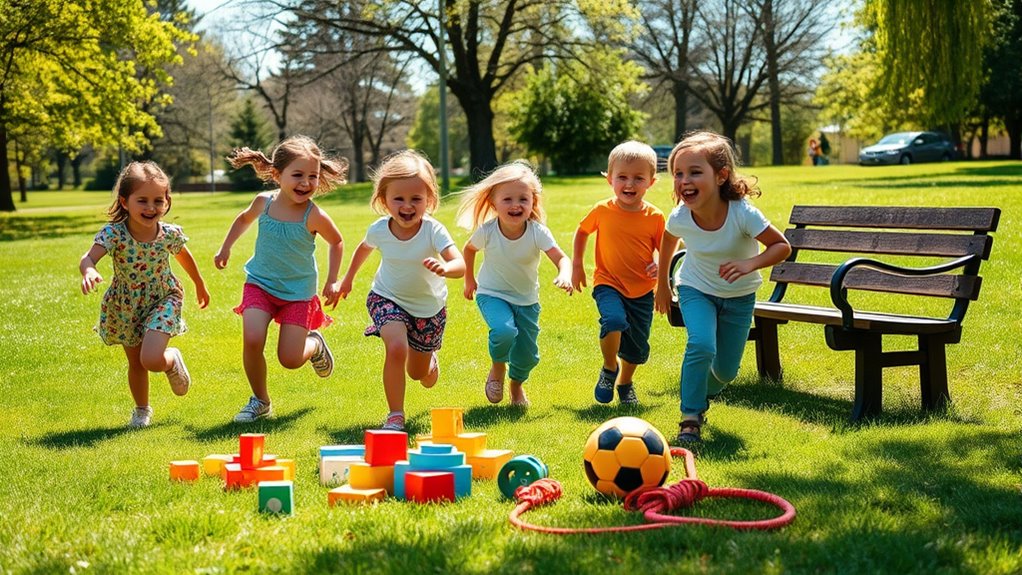
While many parents may underestimate their significance, playdates play an essential role in developing children’s social skills. During these interactions, you’ll notice your child practicing communication skills by expressing thoughts and listening to others.
They learn to cooperate and work as a team, enhancing their problem-solving abilities. Playdates also foster empathy, helping kids understand different perspectives. When conflicts arise, your child gains valuable experience in negotiation and conflict resolution.
Through play, they experiment with social norms, mastering sharing and turn-taking. These experiences lay a strong foundation for building relationships, preparing your child for school, and enhancing their emotional intelligence. Additionally, engaging in playdates helps children develop emotional intelligence and maturity, which are crucial for forming healthy relationships later in life.
Building Lasting Friendships Through Play
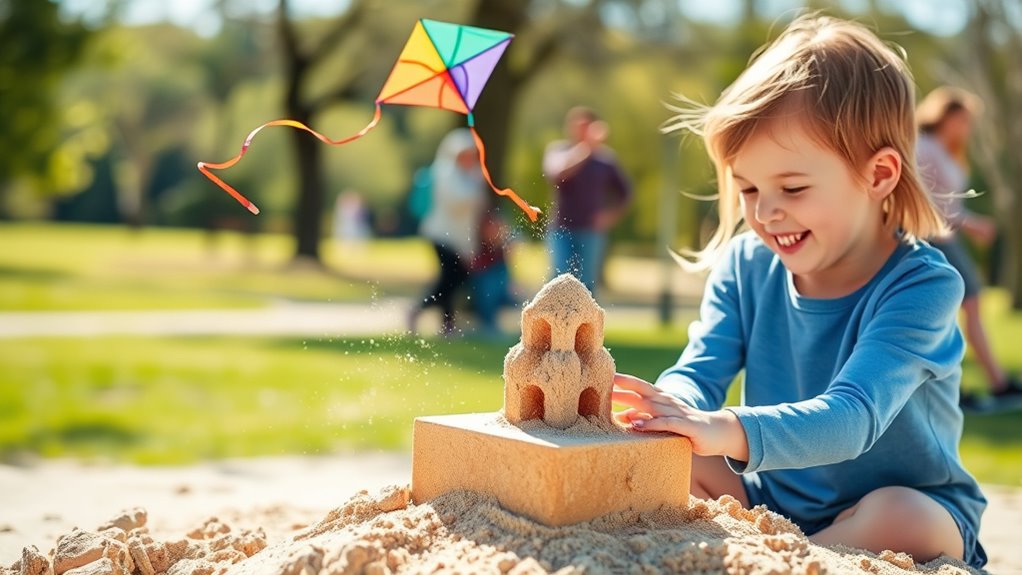
Playdates aren’t just opportunities for fun; they’re key moments for children to build lasting friendships. These interactions help your child form connections that can last a lifetime, providing a solid foundation for social development.
During playdates, kids practice essential skills like communication and cooperation in a safe environment. They learn to share, take turns, and resolve conflicts, which are crucial for maintaining friendships. As they engage with different playmates, they adapt their interaction styles, enhancing compatibility. Engaging in these social experiences fosters emotional regulation, which is critical for managing relationships effectively. Research shows that social interactions during early childhood are essential for developmental milestones, helping to shape their future social competence. Additionally, consistent social engagement can enhance emotional intelligence, equipping children with the tools to navigate complex social dynamics.
With your support, children can develop emotional awareness, which fosters empathy and strengthens bonds. By facilitating regular playdates, you’re helping your child create enduring friendships that not only enrich their lives but also contribute positively to their emotional well-being. Additionally, incorporating educational toys into playdates can enhance developmental benefits, making social interactions even more enriching.
Enhancing Language Skills via Peer Interaction
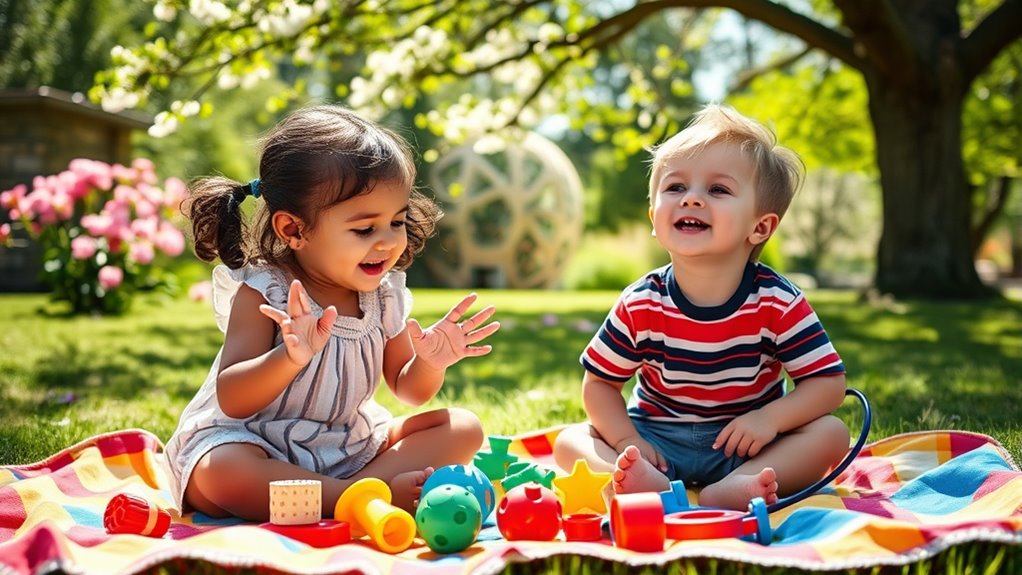
When children interact with their peers during playdates, they naturally enhance their language skills through engaging conversations and shared experiences.
These interactions allow kids to mimic real-life dialogue, improving their vocabulary and syntax. By observing and imitating friends, they grasp new words and language structures, boosting their language development.
Children enhance their vocabulary and language skills by mimicking real-life dialogue during peer interactions, fostering natural language development.
Playdates create a relaxed environment where children can express themselves freely, leading to incidental learning without formal instruction. They also learn essential communication skills, like turn-taking and negotiation, while maneuvering social norms.
Furthermore, exposure to diverse language styles fosters flexibility in communication, making peer interactions a crucial component of language growth.
Ultimately, these connections enrich children’s linguistic abilities and foster autonomy in their learning journey.
Cognitive Growth Stimulated by Play Activities
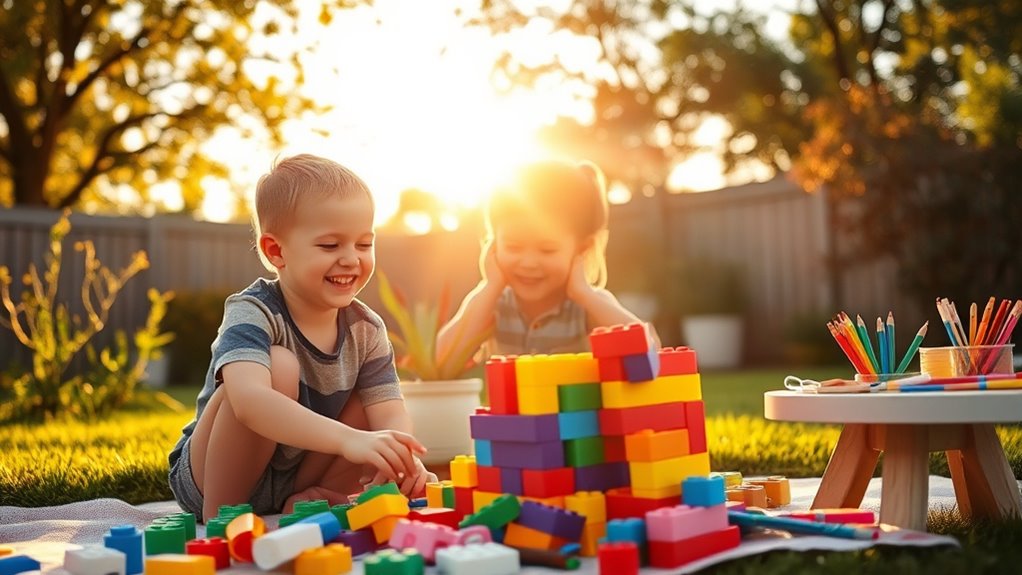
Engaging in play activities greatly boosts cognitive growth as children tackle challenges and explore new ideas. Through play, kids enhance their problem-solving skills by maneuvering through puzzles and memory games, which sharpen their cognitive functions.
Free play encourages critical thinking, allowing them to make independent decisions. Open-ended activities promote mental flexibility and creativity, vital for adapting to new situations.
Moreover, play helps children learn from mistakes, fostering resilience. It encourages exploration and experimentation, fundamental for cognitive growth.
Social interactions during playdates teach cooperation and conflict resolution, enhancing empathy and understanding. These experiences support executive function development, laying the groundwork for lifelong learning.
Regular play not only stimulates brain development but also strengthens the foundation for future academic success.
Physical Development and Coordination Through Playdates
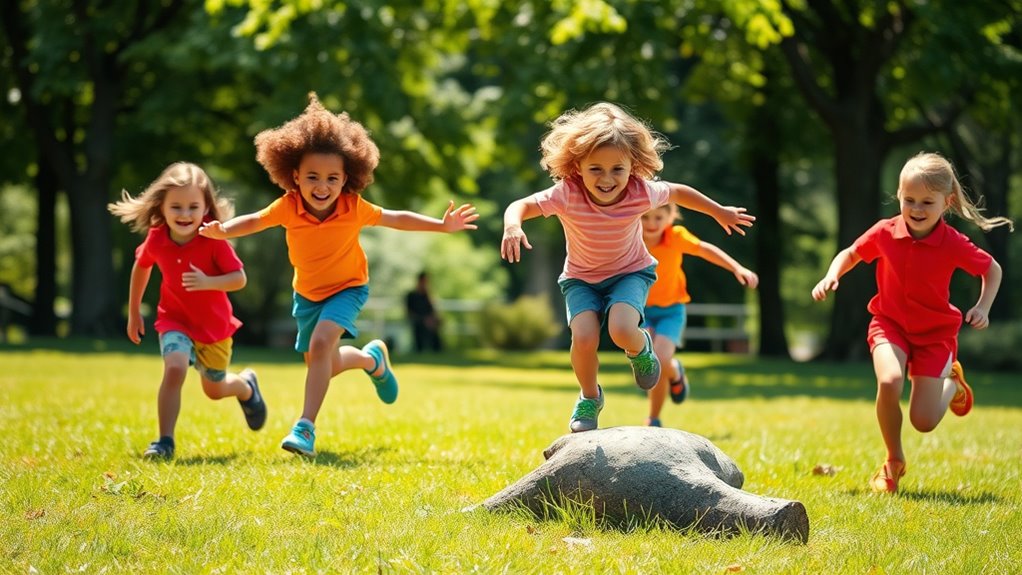
Physical development is essential for children, and playdates provide an ideal setting to enhance their motor skills and coordination.
During these gatherings, kids engage in activities that boost both gross and fine motor skills. Running, jumping, and climbing on playground equipment improve balance and agility, while sports like soccer encourage teamwork and dynamic movement.
In addition, manipulating small toys or engaging in arts and crafts refines their fine motor skills. Spontaneous active play, such as tag or dancing, keeps them physically engaged, promoting better cardiovascular health. Incorporating educational toys during playdates can further support children’s cognitive and physical development in a fun and interactive way.
Emotional Regulation and Empathy in Group Settings
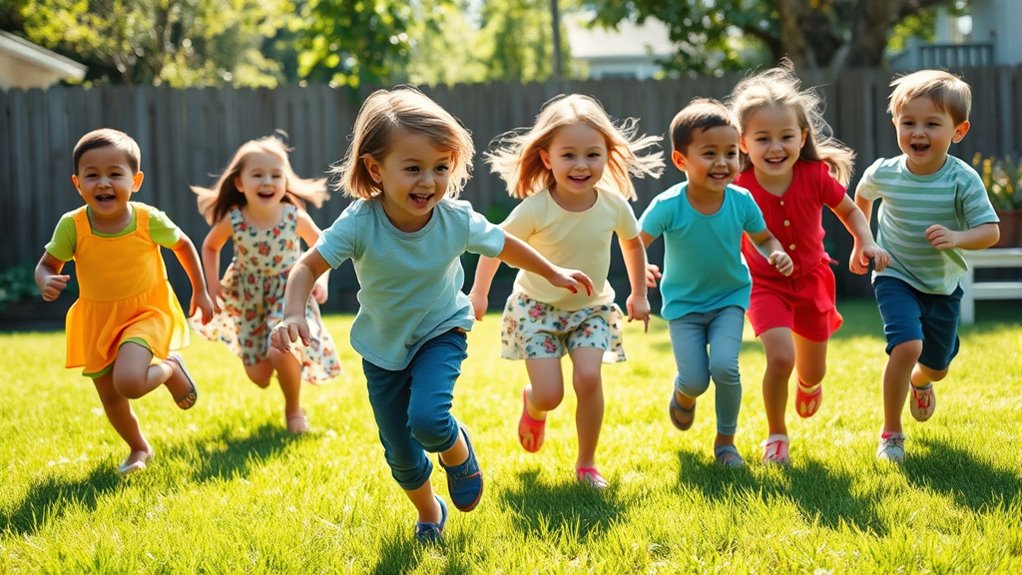
Playdates not only bolster physical skills but also serve as essential opportunities for children to develop emotional regulation and empathy. When your child interacts with peers, they navigate various emotions and learn to manage feelings effectively.
Observing others helps them pick up emotional regulation strategies, creating a supportive environment. Through role-playing and cooperative activities, your child gains empathy by understanding different perspectives and recognizing emotional cues.
These interactions enhance their social competence, teaching them negotiation and conflict resolution skills. Regular playdates build confidence, vital for expressing and regulating emotions.
The Impact of Playdates on Mental Health
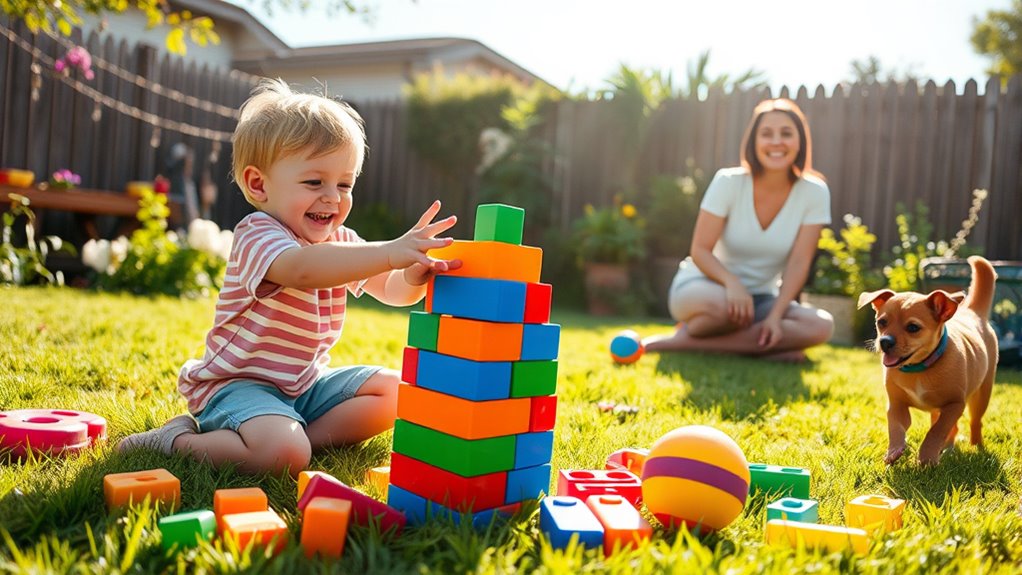
When children interact with their peers in a safe and supportive environment, they experience significant benefits for their mental health. Playdates reduce stress and anxiety by providing a comforting space for socialization.
These interactions not only improve mood but also help develop essential skills like conflict resolution and emotional management. As kids learn to navigate social pressures, they build resilience, preparing them to cope with future challenges.
Friendships formed during playdates create a supportive network that promotes emotional well-being. Engaging in diverse activities fosters cognitive flexibility and enhances communication skills, while encouraging empathy and understanding.
Parental Involvement and Its Influence on Playdates
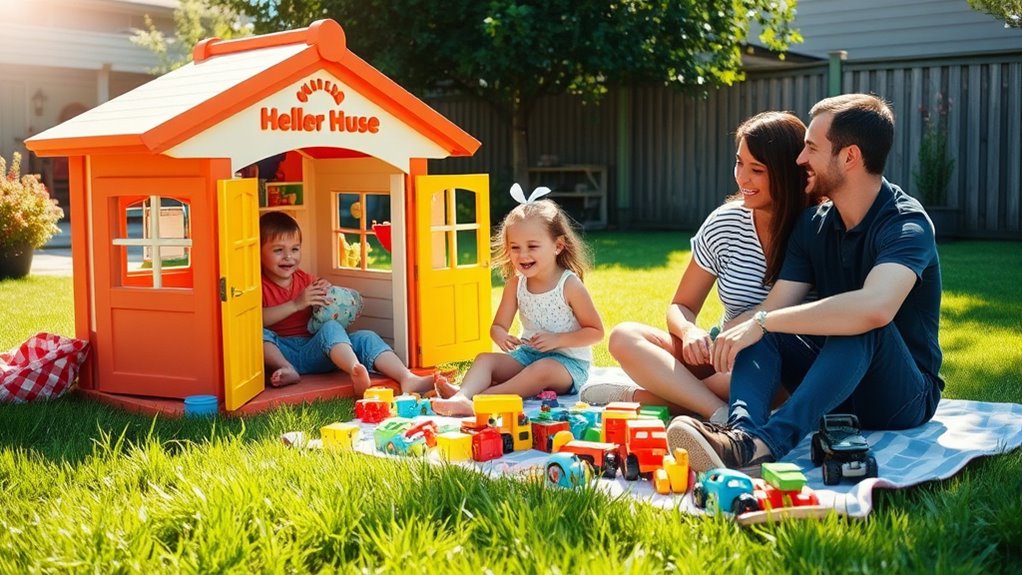
Though you mightn’t realize it, your involvement in your child’s playdates can greatly shape their social development. By creating a safe and welcoming environment, you encourage them to engage with peers.
Your active role in playdates significantly influences your child’s social growth and peer interactions.
Planning structured activities promotes teamwork, while your supervision helps guide conflict resolution and empathy. Open communication during these interactions allows your child to practice essential dialogue skills.
When you model positive social behaviors, like sharing and cooperation, your child learns from your example. Providing emotional support fosters a sense of security, enhancing their social skills.
Setting boundaries teaches appropriate behavior, and your warmth encourages stronger relationships. By being actively engaged, you help your child navigate social dynamics, laying the foundation for lasting friendships. Additionally, fostering emotional well-being during these playdates can lead to improved social interaction and communication skills.
Strategies for Successful Playdate Planning
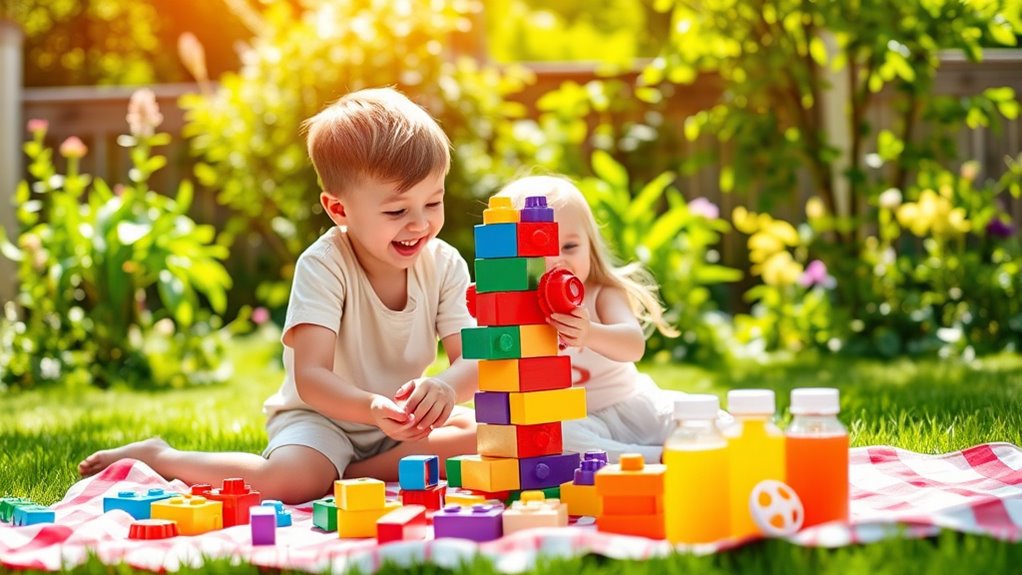
Successful playdate planning involves careful consideration of various factors that can enhance your child’s social experience.
Choose neutral locations like community centers or parks to promote fairness among kids. If your child feels more comfortable, hosting the playdate at home can reduce anxiety.
Plan engaging activities, such as scavenger hunts or board games, to foster interaction and teamwork. Keep playdates short—about 60-90 minutes—to maintain energy and focus.
Be flexible with activities, allowing children to lead and explore their interests. Guarantee a safe environment, supervise the kids, and respect their comfort levels.
Finally, include a clean-up time to teach responsibility while wrapping up the fun. These strategies can create memorable and enriching playdate experiences.
Long-Term Benefits of Early Social Interactions
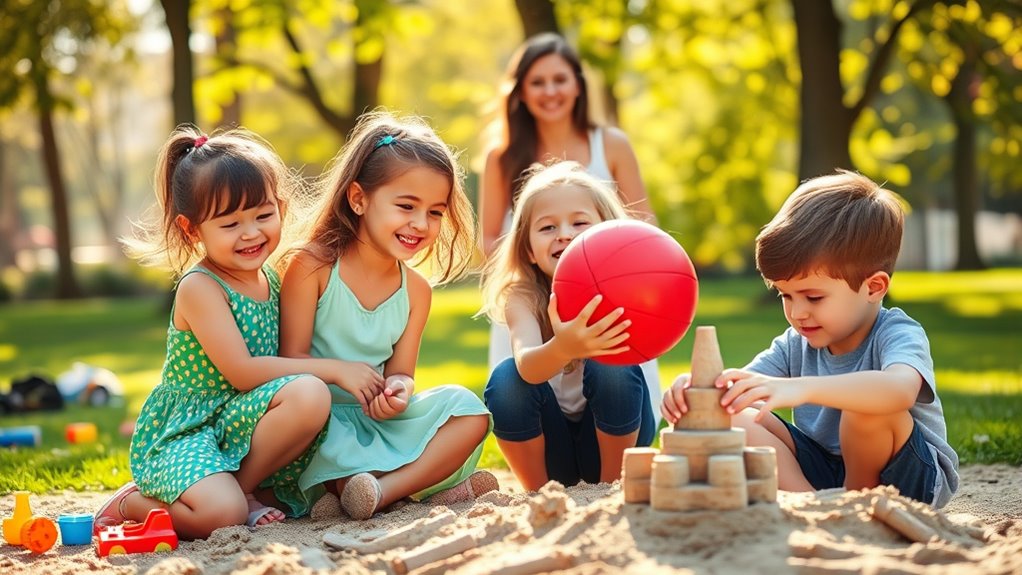
Early social interactions, such as playdates, lay an important foundation for your child’s future relationships and emotional well-being. These early friendships foster important social skills that contribute to better communication and stronger adult relationships.
Kids who engage in playdates often develop higher self-esteem and are better at maneuvering social dynamics. They learn empathy, understand others’ feelings, and improve their emotional regulation, leading to reduced anxiety and stress.
Additionally, these interactions enhance cognitive growth, improving problem-solving and critical thinking skills crucial for academic success. Ultimately, the positive relationships formed during childhood often last a lifetime, providing a strong support network that contributes to happiness, resilience, and a sense of belonging in adulthood.
Frequently Asked Questions
How Can I Encourage My Child to Initiate Playdates?
To encourage your child to initiate playdates, start by discussing their interests and potential friends.
Suggest activities they enjoy, like drawing or building, to break the ice.
Create a comfortable environment at home where they feel safe.
You can also model social interactions by inviting other kids over and showing them how to engage.
Finally, praise their efforts and celebrate any successful connections they make, reinforcing their confidence in social situations.
What Age Is Best to Start Playdates for My Child?
Imagine your two-year-old, Sarah, watching another child play but not joining in.
It’s around this age that playdates can really start to benefit her. You should consider introducing playdates at two, allowing her to engage in parallel play first.
As she grows into cooperative play by age four, her interactions will deepen.
Starting early helps her develop essential social skills while making friendships, setting a strong foundation for future relationships.
How Can I Handle Conflicts That Arise During Playdates?
When conflicts arise during playdates, it’s essential to stay calm and guide the kids through resolution. Encourage them to express their feelings verbally and model phrases like “Can you help me?” to seek assistance.
Use tools like timers for turn-taking to minimize arguments. After resolving the issue, facilitate a discussion about what happened, ensuring both sides feel heard.
What Types of Activities Are Best for Playdates?
Oh sure, because nothing screams “fun” like a structured playdate itinerary!
But really, you’ll find that a mix of activities works wonders. Try turn-taking games for cooperation, arts and crafts for creativity, and group storytelling for communication.
Don’t forget imaginative play and outdoor activities to release their wild sides!
Finally, sprinkle in some sensory play for good measure.
How Can I Find Other Parents to Arrange Playdates?
To find other parents for playdates, start by reaching out to your social circles, like friends, neighbors, or school connections.
You can also use playdate apps to connect with families nearby.
Consider enrolling your child in activities like sports or arts classes, where you’ll meet other parents.
Don’t hesitate to invite families directly, suggesting neutral locations for meetings, and be flexible with scheduling to make it easier for everyone involved.
Conclusion
To conclude, playdates pack a powerful punch for your child’s social skills. By fostering friendships, fueling language, and fueling cognitive growth, these gatherings nurture necessary life lessons. They also promote physical prowess and bolster mental well-being. So, as you plan playful meet-ups, remember that these precious moments pave the path for future connections. Embrace the enchanting energy of playdates, and watch your little one flourish in friendships and fun, cultivating confidence and camaraderie for years to come.









